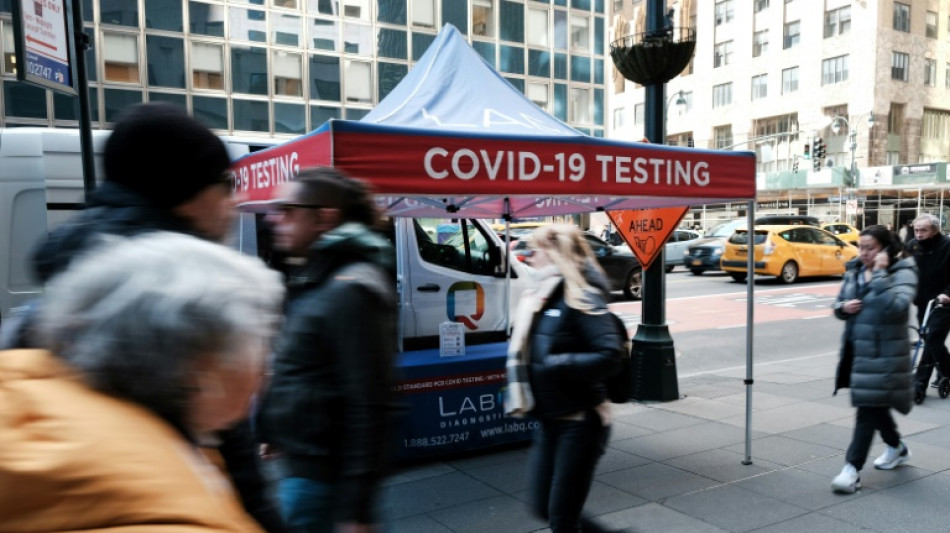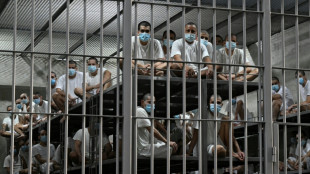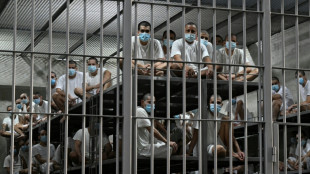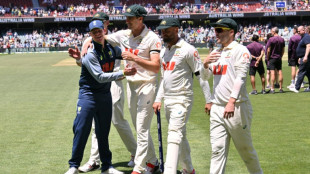
-
 Asian markets rally with Wall St as rate hopes rise, AI fears ease
Asian markets rally with Wall St as rate hopes rise, AI fears ease
-
Jailed Malaysian ex-PM Najib loses bid for house arrest

-
 Banned film exposes Hong Kong's censorship trend, director says
Banned film exposes Hong Kong's censorship trend, director says
-
Duffy, Patel force West Indies collapse as NZ close in on Test series win

-
 Australian state pushes tough gun laws, 'terror symbols' ban after shooting
Australian state pushes tough gun laws, 'terror symbols' ban after shooting
-
A night out on the town during Nigeria's 'Detty December'

-
 US in 'pursuit' of third oil tanker in Caribbean: official
US in 'pursuit' of third oil tanker in Caribbean: official
-
CO2 soon to be buried under North Sea oil platform

-
 Steelers edge Lions as Bears, 49ers reach playoffs
Steelers edge Lions as Bears, 49ers reach playoffs
-
India's Bollywood counts costs as star fees squeeze profits

-
 McCullum admits errors in Ashes preparations as England look to salvage pride
McCullum admits errors in Ashes preparations as England look to salvage pride
-
Pets, pedis and peppermints: When the diva is a donkey

-
 'A den of bandits': Rwanda closes thousands of evangelical churches
'A den of bandits': Rwanda closes thousands of evangelical churches
-
Southeast Asia bloc meets to press Thailand, Cambodia on truce

-
 As US battles China on AI, some companies choose Chinese
As US battles China on AI, some companies choose Chinese
-
AI resurrections of dead celebrities amuse and rankle

-
 Steelers receiver Metcalf strikes Lions fan
Steelers receiver Metcalf strikes Lions fan
-
Morocco coach 'taking no risks' with Hakimi fitness

-
 Gang members given hundreds-years-long sentences in El Salvador
Gang members given hundreds-years-long sentences in El Salvador
-
Chargers, Bills edge closer to playoff berths

-
 Gang members given hundred-years-long sentences in El Salvador
Gang members given hundred-years-long sentences in El Salvador
-
Hosts Morocco off to winning start at Africa Cup of Nations

-
 No jacket required for Emery as Villa dream of title glory
No jacket required for Emery as Villa dream of title glory
-
Amorim fears United captain Fernandes will be out 'a while'

-
 Nigerian government frees 130 kidnapped Catholic schoolchildren
Nigerian government frees 130 kidnapped Catholic schoolchildren
-
Captain Kane helps undermanned Bayern go nine clear in Bundesliga

-
 Captain Kane helps undermanned Bayern go nine clear
Captain Kane helps undermanned Bayern go nine clear
-
Rogers stars as Villa beat Man Utd to boost title bid

-
 Barca strengthen Liga lead at Villarreal, Atletico go third
Barca strengthen Liga lead at Villarreal, Atletico go third
-
Third 'Avatar' film soars to top in N. American box office debut

-
 Third day of Ukraine settlement talks to begin in Miami
Third day of Ukraine settlement talks to begin in Miami
-
Barcelona's Raphinha, Yamal strike in Villarreal win

-
 Macron, on UAE visit, announces new French aircraft carrier
Macron, on UAE visit, announces new French aircraft carrier
-
Barca's Raphinha, Yamal strike in Villarreal win

-
 Gunmen kill 9, wound 10 in South Africa bar attack
Gunmen kill 9, wound 10 in South Africa bar attack
-
Allegations of new cover-up over Epstein files

-
 Atletico go third with comfortable win at Girona
Atletico go third with comfortable win at Girona
-
Schwarz breaks World Cup duck with Alta Badia giant slalom victory

-
 Salah unaffected by Liverpool turmoil ahead of AFCON opener - Egypt coach
Salah unaffected by Liverpool turmoil ahead of AFCON opener - Egypt coach
-
Goggia eases her pain with World Cup super-G win as Vonn takes third

-
 Goggia wins World Cup super-G as Vonn takes third
Goggia wins World Cup super-G as Vonn takes third
-
Cambodia says Thai border clashes displace over half a million

-
 Kremlin denies three-way US-Ukraine-Russia talks in preparation
Kremlin denies three-way US-Ukraine-Russia talks in preparation
-
Williamson says 'series by series' call on New Zealand Test future

-
 Taiwan police rule out 'terrorism' in metro stabbing
Taiwan police rule out 'terrorism' in metro stabbing
-
Australia falls silent, lights candles for Bondi Beach shooting victims

-
 DR Congo's amputees bear scars of years of conflict
DR Congo's amputees bear scars of years of conflict
-
Venison butts beef off menus at UK venues

-
 Cummins, Lyon doubts for Melbourne after 'hugely satsfying' Ashes
Cummins, Lyon doubts for Melbourne after 'hugely satsfying' Ashes
-
'It sucks': Stokes vows England will bounce back after losing Ashes


Scientists develop mobile printer for mRNA vaccine patches
Scientists said Monday they have developed the first mobile printer that can produce thumbnail-sized patches able to deliver mRNA Covid vaccines, hoping the tabletop device will help immunise people in remote regions.
While many hurdles remain and the 3D printer is likely years away from becoming available, experts hailed the "exciting" finding.
The device prints two-centimetre-wide patches which each contain hundreds of tiny needles that administer a vaccine when pressed against the skin.
These "microneedle patches" offer a range of advantages over traditional jabs in the arm, including that they can be self-administered, are relatively painless, could be more palatable to the vaccine-hesitant and can be stored at room temperature for long periods of time.
The popular mRNA Covid-19 vaccines from Pfizer and Moderna need to be refrigerated, which has caused distribution complications -- particularly in developing countries that have condemned the unequal distribution of doses during the pandemic.
The new printer was tested with the Pfizer and Moderna jabs, according to a study in the journal Nature Biotechnology, but the goal of the international team of researchers behind it is for it to be adapted to whatever vaccines are needed.
Robert Langer, co-founder of Moderna and one of the study's authors, told AFP that he hoped the printer could be used for "the next Covid, or whatever crisis occurs".
Ana Jaklenec, a study author also from the Massachusetts Institute of Technology, said the printer could be sent to areas such as refugee camps or remote villages to "quickly immunise the local population," in the event of a fresh outbreak of a disease like Ebola.
- Vacuum-sealed -
Microneedle patch vaccines are already under development for Covid and a range of other diseases, including polio, measles and rubella.
But the patches have long struggled to take off because producing them is an expensive, laborious process often involving large machines for centrifugation.
To shrink that process down, the researchers used a vacuum chamber to suck the printer "ink" into the bottom of their patch moulds, so it reaches the points of the tiny needles.
The vaccine ink is made up of lipid nanoparticles containing mRNA vaccine molecules, as well as a polymer similar to sugar water.
Once allowed to dry, the patches can be stored at room temperature for at least six months, the study found. The patches even survived a month at a balmy 37 degrees Celsius (99 Fahrenheit).
Mice which were given a vaccine patch produced a similar level of antibody response to others immunised via a traditional injection, the study said.
The printed patches are currently being tested on primates, which if successful would lead to trials on humans.
- 'A real breakthrough'? -
The printer can make 100 patches in 48 hours. But modelling suggested that -- with improvements -- it could potentially print thousands a day, the researchers said.
"And you can have more than one printer," Langer added.
Joseph DeSimone, a chemist at Stanford University not involved in the research, said that "this work is particularly exciting as it realises the ability to produce vaccines on demand".
"With the possibility of scaling up vaccine manufacturing and improved stability at higher temperatures, mobile vaccine printers can facilitate widespread access to RNA vaccines," said DeSimone, who has invented his own microneedle patches.
Antoine Flahault, director of the Institute of Global Health at the University of Geneva, said that production and access to vaccines could be "transformed through such a printer".
"It might become a real breakthrough," he told AFP, while warning that this depended on approval and mass production, which could take years.
Darrick Carter, a biochemist and CEO of US biotech firm PAI Life Sciences, was less optimistic.
He said that the field of microneedle patches had "suffered for 30 years" because no one had yet been able to scale up manufacturing in a cost-effective way.
"Until someone figures out the manufacturing scale-up issues for microneedle patches they will remain niche products," he told AFP.
O.Johnson--AMWN



